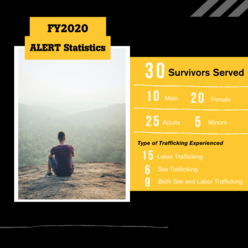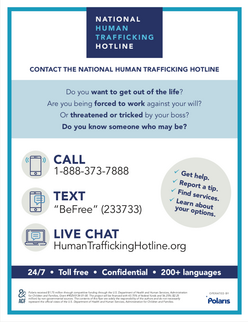
January is Human Trafficking Awareness Month, and the IRC is dedicated to educating the community about this critical issue, our work, and what you can do.
The IRC in Arizona manages the Arizona League to End Regional Trafficking (ALERT) program, which provides comprehensive services to foreign national survivors of labor and sex trafficking.
Read more for a Q&A with IRC’s ALERT team.
What is human trafficking?
Human trafficking takes place when someone engages in commercial sex or labor due to force, fraud, or coercion. However, if the victim is a minor, commercial sex that is induced in any way (with or without force, fraud, or coercion) can be prosecuted as sex trafficking. Each type of trafficking, labor and sex, is a crime under state and federal law and traffickers can be prosecuted for various actions connected to the trafficking.
People, who are often susceptible due to circumstance, are targeted by traffickers who exploit a vulnerability, need, or other situation. Some victims are promised employment, education, or other opportunities for a better life; some are exploited within a relationship, while others are experiencing a different exploitative situation. People who experience trafficking come from diverse demographic, cultural, and linguistic backgrounds and have different trafficking histories that require victim-centered and trauma informed service provision.
Does human trafficking happen in Arizona?
Yes. The IRC and our partners serve countless survivors of trafficking who were trafficked in Arizona. Our clients are male, female, transgender, and of various ethnicities and ages. 70% of clients served through the IRC were from Mexico and Central America, with the remaining 30% from East Asian nations. Although the IRC serves only foreign national survivors, our partner agencies serve large numbers of US citizen survivors.
What exactly does the ALERT Program do for its clients?

We offer the following individualized services based on a client’s needs and situation:
- Interpretation / Translation
- Safety & Security Planning
- Police Investigation & Criminal Prosecution Facilitation
- Financial Assistance
- Referrals to Housing Services
- Referrals to Mental Health, Medical & Dental Services
- Transportation
- Education & Employment Services
- Donations: Clothing, Food, Personal Items, etc.
- Referrals to pro-bono immigration attorneys for T-Visa, U-Visa, & Asylum Applications
- Assistance with filing restraining orders, injunctions against harassment, divorce paperwork, etc.
- Assistance with applying for work permits (EAD) when eligible
- Family Reunification when eligible
How has COVID-19 affected anti-trafficking work at the IRC in Phoenix?
Our IRC ALERT team continues to provide services to survivors of trafficking, just in a different way than we did before. Our caseworker provides services remotely, via phone, and conducts no contact deliveries of essential items and documents. Our outreach team continues to build community contacts, conduct virtual trainings, and host virtual events. The CAUSE Task Force, a team of law enforcement and community agencies, started holding meetings virtually in April and continues to work together. Our clients have experienced increased stress, trauma, and challenges since the start of the pandemic, but our team is working hard to provide clients with needed services.
What should I do if I suspect human trafficking?

If you suspect human trafficking, contact the National Human Trafficking Hotline 1-888-373-7888.
Learn more online: https://humantraffickinghotline.org/
How can I get involved with the IRC ALERT Program?
Find accurate information about trafficking, updates about our programs, and ways to get involved on our Facebook page.
Donate to survivors through our Amazon wishlist.
Contact us directly at: [email protected]